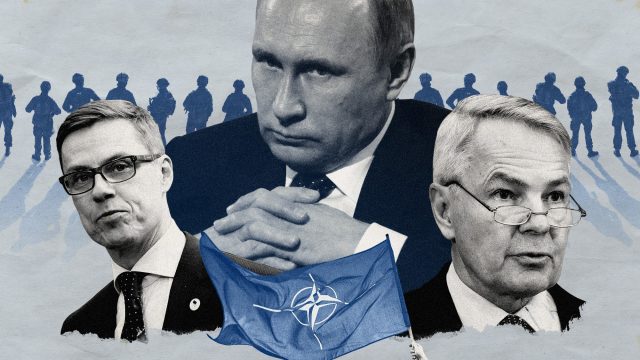
Finland is heading to the polls for a crucial presidential election which has been dominated by the mounting threat from neighbouring Russia.
The new Nato member has begun advance voting ahead of the main ballot this Sunday, with popular conservative President Sauli Niinistö stepping down after two six-year terms. Two of the nine candidates “have emerged as clear favourites”, said Euronews, and “represent the left and right wing of the Finnish political spectrum”.
Vying for the top job is former prime minister Alexander Stubb (only slightly ahead in the polls) of the ruling right-wing National Coalition Party and Pekka Haavisto, the Green candidate and former foreign minister. If elected in the main ballot later this month, Haavisto would be the country’s first gay president.
Political leaders across Europe “will also be watching the Finnish vote with interest”, said Politico, given its “key geostrategic position along Nato’s longest border with an increasingly belligerent Russia”. The election’s outcome could have far-reaching implications for the Nato security alliance, the Nordic-Baltic region and the threat to both from Russia.
A bellwether for Europe
The Finnish president has considerable powers, responsible for the defence and foreign policy of one of the world’s most successful economies, while the prime minister runs the executive government branch. The president also attends Nato summits, and “declares war and peace”, said Al Jazeera.
Thanks to Finland’s “liberal democratic values, economic health and support for Ukraine”, the Nordic country is also a “standard-bearer of Western positions and institutional strength on the border with Russia”, said the news site.
It also comes as neighbouring Sweden moves a step closer to joining the Nato security alliance, with the Turkish parliament ratifying its membership bid and President Recep Tayyip Erdoğan now expected to sign the accession. “This will strengthen the whole Alliance and regional security,” Latvian President Edgars Rinkēvičs posted on X.
Both Sweden and Finland jointly applied to join Nato in 2022, after Russia’s invasion of Ukraine prompted both countries to drop their traditional neutrality.
Like Finland’s current leaders, former prime minister and presidential hopeful Stubb had previously argued that admitting Finland would strengthen Nato and “maximise security in Europe”.
The election could also help observers predict the direction of European politics, ahead of parliamentary elections in June.
A new report has warned that populist, anti-EU parties are projected to do well in European Parliament elections this year.
The report by the European Council on Foreign Relations said populists should top the polls in nine countries, and come second or third in a further nine. The surge could derail the EU’s support for Ukraine and the European Green Deal, the report authors warned, and should serve as a “wake-up call” to policymakers.
Antagonistic neighbours
Finland controls the EU’s longest border with Russia, noted Al Jazeera, and is “one of a handful of EU members to have fought a war” with the country.
While Finland had historically stayed out of Nato to avoid antagonising its neighbour, Russia, Putin’s invasion triggered “a profound change” in the country’s thinking, said The Guardian. The country has since erected barbed-wire fences along parts of its eastern border with Russia.
Finland’s geopolitical position “has shifted from being an uninteresting pocket of peace to a potential new flashpoint that Russian state propaganda is actively targeting”, wrote Dr Sari Arho Havrén for The Royal United Services Institute (RUSI), Europe’s leading defence and security think tank. In a time of “tectonic global shifts”, Russian border issues “have become increasingly relevant in the presidential campaign debates and for the future of Finland”.
Despite this, Niinistö was once dubbed the “Putin whisperer” for his contacts with the Russian leader, said Foresight News – but “unfortunately for Russia, there’s little daylight between Stubb and Haavisto when it comes to the threat posed by Moscow”.
The two leading presidential candidates “have both said they will take a hard line on Russia”, noted Politico. But Stubbs told the site that when he left Finnish politics seven years ago, he thought it would be for good.
“The plan was to do something else with my life,” he said. “Russia’s attack on Ukraine changed my mind.”
Country has key geostrategic position along Nato’s longest border with an increasingly belligerent Russia






